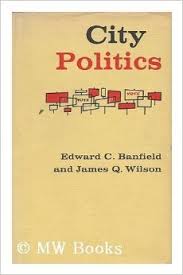With James Q. Wilson, Cambridge: Harvard University Press, 1963.
City Politics examines the structure of urban politics: the electoral system, the distribution of authority, the centralization of influence; and analyzes the forces and groups involved: reform, non-partisanship, businessmen, the Negroes. The authors see a steady trend toward middle-class values in politics–honesty, “good government,” concern for the entire community as opposed to specific neighborhoods. As these middle-class values gain acceptance, the old political machines crumble and are superceded by stronger centralized governments. Although administrative authority becomes concentrated, effective political power decreases, because the centralizing influence of the machine has been destroyed.
“What Professors Banfield and Wilson do in this remarkable book is in four sections (entitled respectively ‘The Nature of City Politics,’ ‘The Structure of City Politics,’ ‘Political Forms and Styles,’ ‘Some Political Roles’) dissect the political and administrative aspects, processes, and interactions of city government. Generalizations and trends are drawn from a wide spectrum and a successful attempt is made to present a hypothesis upon which one can build an understanding of the structure and workings of the modern North American” — Lionel D. Feldman

